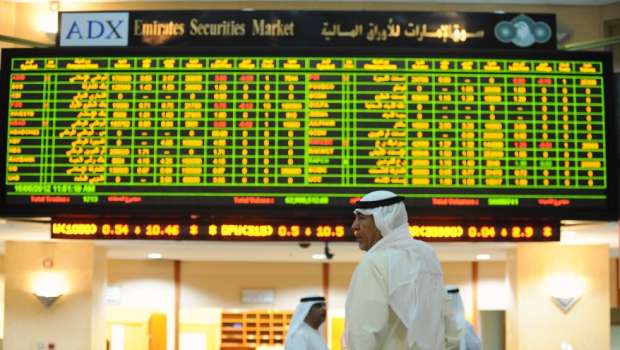
Electronic boards displaying stock information at the Abu Dhabi Securities Exchange (ADX) stock market, UAE, on May 16, 2012. (Reuters)
Last year Abu Dhabi and neighboring Dubai hired banks to advise on a possible state-backed merger of the ADX with the Dubai’s stock exchange, the Dubai Financial Market (DFM), which would be one of the biggest reforms in the UAE’s financial industry in recent years.
Addressing a news conference at a financial event in the UAE capital, ADX CEO Rashed Al-Baloushi declined to comment on progress in the talks or say whether a merger was likely.
But he said that if a merger did not happen, consolidating both exchanges’ back offices, which handle record-keeping and other administrative tasks, would be a good alternative. Other bourses in the Gulf Cooperation Council could unify their back offices with the UAE’s combined system later, he added.
“It is a good step forward and very important for the stock markets. At ADX we will consider that point,” Baloushi said, citing the example of Cairo and Alexandria as well as European exchanges.
Baloushi said the ADX was initiating the idea of combining back offices and was recommending it to all stakeholders, including investors, listed companies and brokerages. He did not say when it might take effect. The DFM declined to provide any immediate comment.
Consolidating the back office operations of the ADX and DFM could cut costs and, by creating a single framework for settling trades, make it easier for more foreign investors to enter the UAE, fund managers and analysts say.
Because of political sensitivities and fast-changing valuations—the DFM’s shares rocketed 142 percent last year as trading volumes in Dubai’s market boomed—the two emirates could find it difficult to agree on a full merger. A partial consolidation might be much easier.
“You can easily merge the back offices of Dubai and Abu Dhabi stock markets,” Jeffrey Singer, chief executive of the DIFC Authority, which oversees Dubai’s financial center, told reporters at the event.
“When international investors look at the pool, they’ll see more companies, more scale and liquidity here.”
Singer was formerly chief executive of NASDAQ Dubai, the smaller of Dubai’s two stock markets, which has already consolidated back office operations with the DFM.
The ADX expects this year to introduce market makers, dealers which maintain trading liquidity by undertaking to buy or sell at specified prices at all times, Baloushi said, adding that the exchange was working closely with the UAE regulator to establish a legal framework for this.
